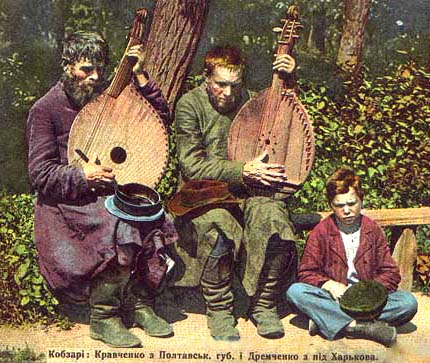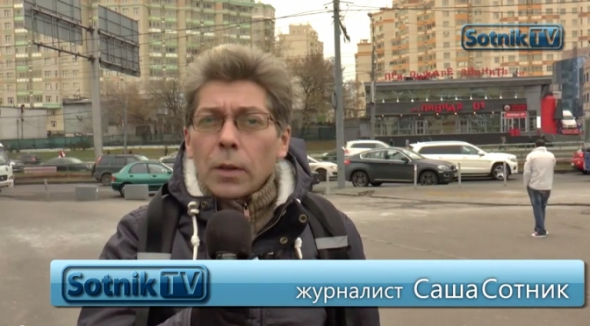In early December 1930, a Congress of the Folk Singers of Soviet Ukraine, with 337 delegates from different oblasts, was held at the Opera Theater in Kharkiv. The stated objective of the congress was to involve the folk singers in the building of socialism and to give them new ideological priorities while distancing them from their traditions.
After adopting relevant resolutions, the kobzars (itinerant Ukrainian bards, often blind, who sang to their own accompaniment on a multi-stringed bandura or kobza instrument -- Ed.) were packed into train cars under the pretext of a trip to Moscow for the Congress of Folk Singers of the USSR and taken to the outskirts of the Kozacha Lopan station. Late that night the blind singers were taken from the train cars to the edge of the forest where trenches had already been dug. After lining up the blind kobzars and their young guides in one file, the special NKVD unit (Soviet secret police, predecessor of the KGB -- Ed.) began shooting. When everything was over, the bodies of the executed were covered with lime and earth. Their musical instruments were burned… (Note: other references place the tragedy in 1933 - Ed.)
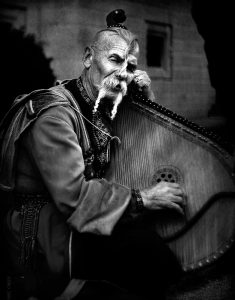 It is useless to look for even a cursory mention of the execution of the kobzars in the Soviet press. Researchers cannot even find documentary evidence of this terrible tragedy in the archives of the former NKVD-KGB. The NKVD agents knew how to cover up the traces of their crimes. As early as 1960, Alexander Shelepin, the KGB head at the time, issued a secret directive ordering his agencies "from Moscow to the furthest peripheries" to burn everything that could compromise the "heroic" agencies in the future . Yet the truth about the executed congress of kobzars and lirnyks (itinerant musicians who performed epic songs to the accompaniment of a lira, the Ukrainian version of the hurdy-gurdy -- Ed.) stubbornly arises from the ashes of oblivion.
It is useless to look for even a cursory mention of the execution of the kobzars in the Soviet press. Researchers cannot even find documentary evidence of this terrible tragedy in the archives of the former NKVD-KGB. The NKVD agents knew how to cover up the traces of their crimes. As early as 1960, Alexander Shelepin, the KGB head at the time, issued a secret directive ordering his agencies "from Moscow to the furthest peripheries" to burn everything that could compromise the "heroic" agencies in the future . Yet the truth about the executed congress of kobzars and lirnyks (itinerant musicians who performed epic songs to the accompaniment of a lira, the Ukrainian version of the hurdy-gurdy -- Ed.) stubbornly arises from the ashes of oblivion.
It is well known that Stalin and his henchmen had a physical hatred of everything that distinguished Ukrainians as a separate ethnic group among the oppressed peoples of the (Russian) empire. And if the Ukrainian language and Ukrainian song were somewhat tolerated in the beginning of the Communist rule, the carriers of Ukraine's heroic epic -- the kobzars -- were a constant irritant. From the first days of the establishment of the government of "workers and peasants" in Ukraine, the Bolsheviks hunted down the blind, infirm folk musicians and executed them on the spot, without investigation or trial. In 1918, the lirnyk Yosyp was murdered. In 1919, in Katerynodar, the Bolsheviks murdered the kobzars Ivan Lytvynenko, Andriy Slidiuk, Fedir Dibrova. In 1920, they murdered Antin Mytiay, Svyryd Sotnychenko, Petro Skydan…
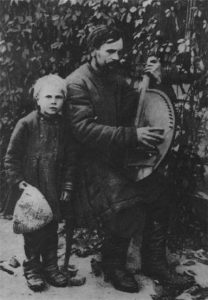 Yet these measures did not solve the problem. There were simply too many kobzars in Ukraine at that time, who were loved and honored by the people. Then the Central Committee of the Communist Party of the Soviet Union decided to change tactics and adopted several resolutions that prohibited begging, restricted musical performances, and required compulsory registration of musical instruments with the police and the NKVD, as well as approval of the repertoire by the education commissars. Now the kobzars were no longer killed on the spot as before but imprisoned without food or water and their instruments were destroyed.
Yet these measures did not solve the problem. There were simply too many kobzars in Ukraine at that time, who were loved and honored by the people. Then the Central Committee of the Communist Party of the Soviet Union decided to change tactics and adopted several resolutions that prohibited begging, restricted musical performances, and required compulsory registration of musical instruments with the police and the NKVD, as well as approval of the repertoire by the education commissars. Now the kobzars were no longer killed on the spot as before but imprisoned without food or water and their instruments were destroyed.
But even this was not very effective. Then a ruthless press campaign was launched that labeled the kobzars an "incorrigible nationalist element." The contemporary newspapers featured headlines denouncing the kobzars and calling for their supervision. One headline announced that "the kobza is a musical plow." Another headline proclaimed that the harmonica was replacing the kobza: "The magic harmonica is becoming and to some extent has already become the real means for educating the masses!" A people who throughout ages loved the art of the kobza were being forcibly made to accept not only the "magic harmonica" but also the "magic accordion" and the "magic balalaika," forcing factories in Ukraine to produce these instruments by the tens of thousands.
Even Ukrainian writers were enlisted to persecute the kobzars. Thus, Yuriy Smolych wrote that "the kobza conceals a real threat because it is too tightly tied to the nationalistic elements of Ukrainian culture and the romanticism of the Cossacks and the Zaporozhian Sich (semi-autonomous Ukrainian Cossack state in the 16th to 18th centuries). The kobzars have tried to resurrect this past by all means. The medieval baggage of zhupan and sharovary (vest and trousers in Ukrainian national costume -- Ed.) are pressing on the kobza," he concluded.
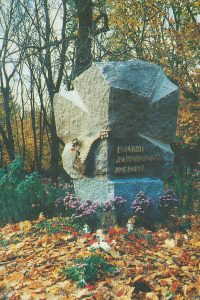
Mykola Khvylovyi called for an end to this "kobzified" Ukraine, insisting on the need to "punch out this kobzified psyche of the people." But Mykola Bazhan surpassed everyone in his poem "The Blind," where he calls the kobzars "whiners," "smelly riffraff," and their repertoire of ancient Ukrainian epics "damned songs."
However, not all Ukrainian cultural leaders were on the NKVD leash. Pavlo Tychyna was not ashamed to pose for the camera with the "patriarchal nationalistic" kobza, and Maksym Rylski in those terrible years came to the defense of the art of the Ukrainian kobza. Somehow the authorities forgave Tychyna his fondness for the "old-world" kobza but they were not as indulgent with Maksym Rylski. For decades he was threatened with spiritual and physical destruction, as were many artists, folklorists and researchers of the art of the kobza. They included Mykola Domontovych, Porfyr Martynovych, Klymentiy Kvitka, Opanas Slastion, the writer and kobza performer Hnat Khotkevych and Dmytro Yavornytskyi, "the kobzar father," who was fired from his post as director of the Dnipropetrovsk Historical Museum.
Despite their efforts, the Bolsheviks were not able to "knock out the kobzified psyche" of the Ukrainian people. Then the Bolsheviks resorted to purely crafty methods of control. Many kobzars who had not "tarnished" their peasant-proletarian biographies by participating in the national liberation struggle were driven to the "kolhosps," the collective capellas, ensembles, quartets, trios. According to the kobzar specialist Serhiy Kindzeriavyi-Pastukhiv, "the national bard was being transformed into a political liar for the Communist party, and the capellas, which the singer were forced to join, became the basis of their reeducation." The education commissars and the NKVD forced other kobzars to create "songs" and "dumy" (epic songs -- Ed.) to celebrate the soviet reality.
However, most of the kobzars refused to include the artificial "dumy" in their repertoires, preferring to sing the ancient "laments of the enslaved" and to continue to resurrect the people's historical memory as they travelled from village to village, from town to town.
Then someone from Stalin's entourage had the idea to gather all the kobzars and lirnyks supposedly for a congress, to execute all of them and destroy their instruments. They originally planned to hold the congress in 1925 and then rescheduled it for December 1, 1927. But it did not take place then either, possibly because the so-called ethnographic commission created for this purpose by the Academy of Sciences of the USSR had not yet managed to register all the kobzars.
The tragedy of the Ukrainian kobzars was described in "Testimony," Dmitri Shostakovich's memoirs "as related to and edited by" Solomon Volkov, a Russian musical journalist, which was published in London in 1979.
"Since time immemorial, folk singers have wandered along the roads of Ukraine." Volkov quotes Shostakovich. "They were almost always blind men … but no one ever touched or hurt them… And then in the mid thirties the First All-Ukrainian Congress of Lirnyks and Bandurysts was announced, and all the folk singers had to gather and discuss what to do in the future. 'Life is better, life is merrier,' Stalin had said. The blind men believed it. They came to the congress from all over Ukraine, from tiny forgotten villages. There were several hundred of them at the congress, they say. It was a living museum, the country's living history. All its songs, all its music and poetry, And they were almost all shot, almost all those pathetic blind men killed… Why was it done? … Just like that, so that they wouldn’t get underfoot. Mighty deeds were being done… Collectivization. Mechanization. It was easier to shoot them. And so they did."
In his book the "Harvest of Sorrow" the renowned scholar Robert Conquest also mentions this assault on Ukraine's "national heritage."
"The popular and patriotic culture of Ukraine had long been sustained in the countryside by the blind bards -- the Kobzars, celebrated by Shevchenko -- who wandered from village to village, earning their keep by singing the old national songs and reciting the national ballads. Thus the peasantry were constantly reminded of their free and heroic past. This undesirable phenomenon was now suppressed… Most of them (Kobzars) are reported shot -- logically enough, for they would have been little use at forced labor in the camps."
Note: It appears the executed kobzars are still viewed as a threat. Sometime in early December this year unknown persons vandalized the monument to the repressed kobzars of Ukraine, located in the Taras Shevchenko park near the Kharkiv Opera Theater in the center of the city. The monument was funded by donations of Ukrainian citizens on the initiative of the Union of Ukrainian Youth of Kharkiv and officially unveiled on October 14, 1997.

